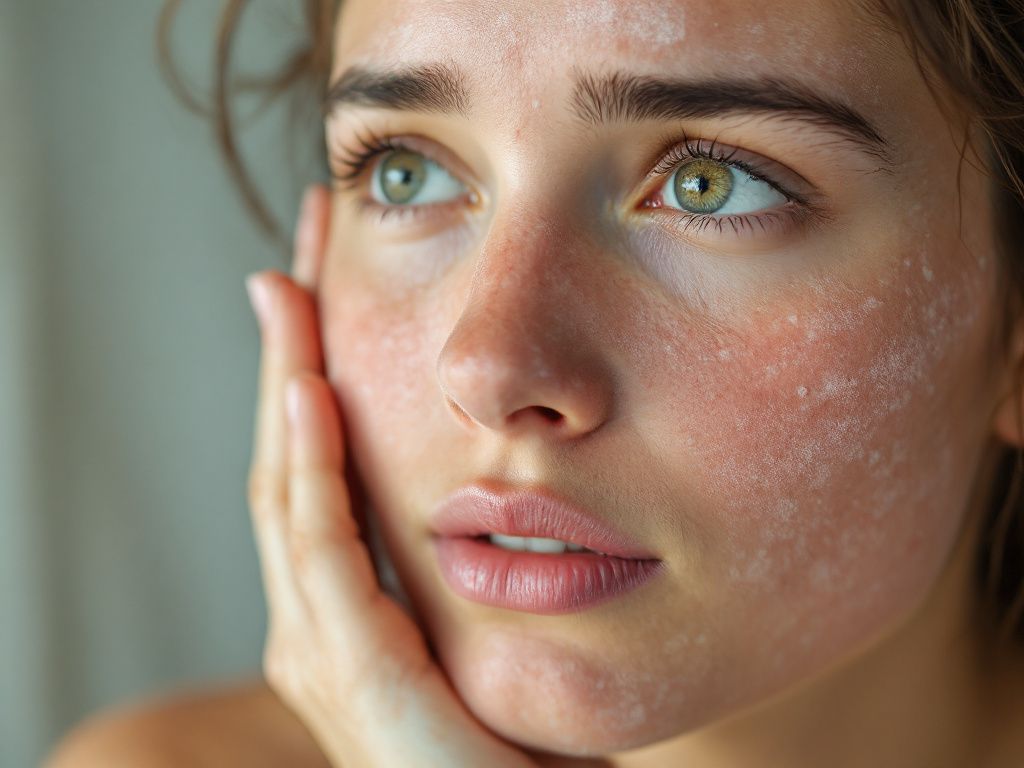Ah, the intricate world of skin care—a place where mysteries seem to run deep beneath our skin’s surface. Imagine this: you wake up one morning, and there, right on your forehead, is an unexpected guest—yes, another pimple. But wait, you’ve always heard that acne comes from oily skin, and here you are dealing with a bout of dry skin like it’s the Sahara Desert on your face.
The question pops up—does dry skin cause acne? Let’s unravel this enigma, chat a bit about those misunderstood flakes of skin, and maybe knock a myth or two off its pedestal. Trust me, you’ll want to stick around for this one.
Table of Contents
ToggleUnderstand the Basics: What is Acne?
Before diving into the dry skin debacle, it’s important we give acne its fair share of spotlight. Acne is not just about what you see on the surface. It’s like dealing with a grumpy neighbor—a result of complex undercurrents like blocked pores, excess oil production, hormones running riot, and sometimes even bacteria jumping in to stir the pot.
The Usual Suspects
Normally, acne roams with oily skin as its BFF. Picture this team of excessive sebum (that’s oil, for common folks like us), dirt, dead skin cells, and a community of bacteria. Together, they block pores and—bam!—welcome to pimple-ville.
But it seems our friend acne might just enjoy a shocking plot twist: thriving even when skin seems parched, cracked, and thirsty. How does that make sense? Let’s find out.
Cracking the Dry Skin Code
It’s super easy to brush dry skin off as just an inconvenience. “Oh, look at those flakes; I’ll just moisturize later.” But lurking behind every flake can be a world of irritation. Dry skin lacks the moisture it needs, which compromises its role as the skin’s protective barrier. It’s that squeaky wheel part of your car—until the mechanic steps in and explains just how crucial it really is.

A Deeper Look into Dry Skin Conditions
Whenever your skin screams for moisture, it affects the whole factory of skin balance. Imagine there’s a silent revolution growing under the surface—a micro rip or tear here could spell trouble for your sensitive underlayers.
And here’s a kicker—those dry cracks? They can lead to your skin going into overdrive with oil production as it screams, “Moisture, please!” Ironically, it’s trying to save itself but ends up giving acne a friendly handshake in the shadow.
The Unexpected Connection: Does Dry Skin Cause Acne?
Here is where it gets interesting: while dry skin doesn’t directly cause acne like oily skin, it certainly doesn’t help. It’s like running interference in a way that could worsen acne or make way for it to set up shop.
Dry Skin’s Contribution to Acne
- Barrier Function Chaos: When dry skin breaks its barrier, bacteria now have a freeway-ready entry. This plays an indirect yet significant role. Damage here opens the door for acne-causing stuff to pop by for a visit.
- Inflammatory Invitations: Dry skin is often inflamed skin. We’re talking redness, irritation—the full works. And when your skin inflames, your body jumps into battle mode, willing to entertain that “pustule at first sight.”
- Compensatory Sebum Spike: This weird “reciprocity” fight-back often means dry skin, especially notoriously dehydrated conditions, could trigger sebum production. Just enough to play its part all over again with acne issues.
- Matchmaking with Harsh Skin Products: People often reach for the big guns when handling dry skin—exfoliants and treatments that may only worsen things. Less moisture means more vulnerability, and potentially a match made in breakout heaven.
Developing an Effective Skin Strategy

Alright, now let’s brainstorm solutions. Getting rid of acne stems from more than just treating the skin condition but also understanding it. No rocket science here—just some practical, maybe old-school-but-golden steps.
1. Knowing Your Skin Type
Before attempting to fix anything, really know your skin. Sounds simple, no? Assess whether it’s dry, oily, a mish-mash, or setting up base camp in sensitive territory. This might be worth a daydream by a sunny window—observe how your skin behaves at different times.
2. Nailing the Moisture Balance
Balance is key, my friends. And when it comes to moisture, your dry skin probably needs more than a casual lip-service reminder in your head to hydrate.
- Moisturize Wisely: Opt for fragrance-free, gentle moisturizers. Look for hyaluronic acid or glycerin, and plant-based oils. Authority tip: do the moisturizer dance right after cleansing your skin.
- Hydrate from Within: Don’t underestimate the might of good ol’ water. Keep sipping to help your skin stay plump and ready. Lunch breaks and cool jams—perfect hydration reminders.
3. Stay Away from Skin Saboteurs
Dry episodes call for a gentle approach. Keep away from aggressive exfoliation or harsh cleansing. Swap it for milder alternatives that respect your skin’s rave rhythm.
4. Preach Temperance
In the end, one must aim not just to react but to protect. Stick to lukewarm water in the shower, ditch dry oxygen-soaking air, and build an unyielding will against the excess dose of hot, steamy affairs.

Some Skin Facts Worth Considering
To wrap this conversation into a neat little bow, here are some stray yet significant facts:
- Seasonal Myths: Winter skin doesn’t have to mean dry and acne-packed misery. Combat it with consistent habit loops. More humid climates? You still need moisture—it just takes strategic adjustments.
- The Circle of Hormones: For many, dry skin turns into acne when hormones strike. Know that the stress of skin shifts is normal. Breathe, adjust, optimize.
- Seeing a Pro: If every DIY chapter ends with a cliffhanger, it’s totally okay to lean on professionals. Dermatologists can help nail customized regimes and treatments.
In Closing: Decoding the Balancing Game
The ultimate fine print: our skin can be quirky, lovable, yet super-intuitive. It’s not just about fighting fire with fire or effectively vanquishing oil or dryness like an ultimatum battle. In an odd but genuine quirk, even dry skin can shake hands with acne. Although acne initiates aren’t direct partners, the links weave a subplot that triggers reactions.
And there you have it! Knowing if dry skin causes acne means embracing imperfection, nurturing deeper layers, and fitting those sunlit joys and weary woes into the mix.
Next time that acne patch interrupts your day, remember you’ve got allies, insights, and the fiery perseverance to cozy up with candles, tongues, and skin predictions.
So, is your cup of hydration ready—how’s leveling romance with the wonders of skincare rolling?
Trust the process. Trust your skin.
Frequently Asked Questions
Does dry skin directly cause acne?
Dry skin does not directly cause acne, but it can contribute to the development of acne. Dry skin can trigger excess oil production to compensate for the lack of moisture, which can lead to clogged pores and acne. Additionally, dry skin can cause irritation and redness, making it more prone to breakouts[1][3][4).
How does dry skin contribute to acne breakouts?
Dry skin can contribute to acne breakouts in several ways. It can lead to an overproduction of sebum to counteract the dryness, which can clog pores. Dry skin also makes pores more susceptible to breaking open, allowing acne-causing bacteria to penetrate deeper into the skin. Furthermore, dry skin can cause an excess buildup of dead skin cells, which can clog hair follicles and lead to acne[1][3][4).
What are the best skincare practices for treating acne on dry skin?
For treating acne on dry skin, it is crucial to maintain a gentle yet effective skincare routine. This includes using a hydrating facial cleanser, avoiding harsh products that can strip the skin of its natural moisture, and applying non-comedogenic moisturizers. Products containing salicylic acid, hyaluronic acid, and niacinamide can be effective in treating acne without exacerbating dryness. Regular moisturizing, gentle exfoliation, and avoiding over-washing are also important[2][4][5).
What ingredients should I avoid in skincare products if I have dry, acne-prone skin?
If you have dry, acne-prone skin, it is advisable to avoid skincare products containing ingredients like alcohol, acetone, lanolin, mineral oil, petrolatum, and coconut oil. These ingredients can further dry out your skin and worsen acne. Instead, opt for products labeled as non-comedogenic and those containing hydrating ingredients like hyaluronic acid and niacinamide[2][4][5).
References







